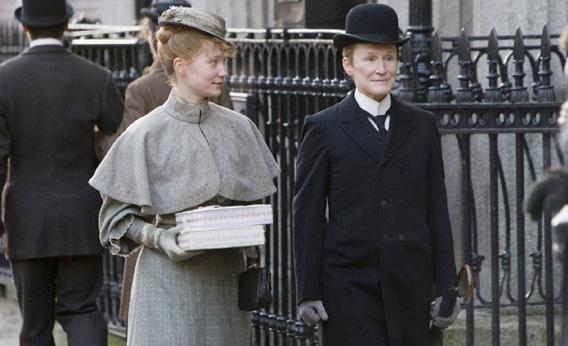Albert Nobbs (Glenn Close), the diminutive protagonist of Rodrigo Garcia’s film of the same name, works as a waiter in a posh hotel in late 19th-century Dublin. He speaks little and, when he does, reveals still less. Outside of a cordial master/servant relationship with Dr. Holloran (Brendan Gleeson), a hard-drinking physician in residence at the hotel, the passive, blank-faced Nobbs seems to have no friendships at all. As he prepares for bed one night in his tiny, drab bedchamber, we learn the truth about this cipher of a man: Albert is in fact a woman who’s been passing as male since her hardscrabble teenage years in order to find work and avoid harassment at the hands of men.
Of course, Albert Nobbs’ true gender was never a secret to us, since the novelty of Glenn Close’s drag turn has played a key role in the movie’s advance marketing, and has now helped to garner both Close and her co-star Janet McTeer Oscar nominations. That’s not to say that Close and McTeer are undeserving; both women give outstanding performances (albeit in two completely different styles—more on that later.) But cross-dressing roles, however well-performed, do have a built-in Oscar appeal. They’re by definition big performances, even if the character in question is (like Albert Nobbs) a small, unobtrusive person.
The trick Close has to pull off here is all the more difficult given the closed-off nature of her character: She not only has to play a woman pretending to be a man, but to play a person who’s constantly pretending, who seems to have no idea, after so many years in hiding, what it would mean to live as a woman or a man. What, if anything, Albert desires, sexually or otherwise, we never really find out. Albert Nobbs is the portrait of a person with an inner life so inaccessible that even he or she no longer knows what’s going on in there. (I don’t even know whether to use the masculine or feminine pronoun in writing about the character; I’m choosing to go with “him,” if only because it seems like the hyper-discreet Albert would have wanted it that way.)
Albert does at one point try to court Helen Dawes (Mia Wasikowska), a much-younger hotel employee who’s more interested in her handsome, abusive boyfriend (Aaron Johnson). But it’s plain that Albert desires Helen more for the sake of companionship and respectability than for anything physical. Albert longs to get out of the personal-servant business, open his own tobacco shop and find himself a little missus; he hasn’t quite worked out when, how, or whether to tell said missus his lifelong secret.
Albert’s sudden commitment to settling down is inspired by his acquaintance with Hubert Page (McTeer), a workman who comes to the hotel to make some repairs and is forced by circumstance to spend one night in Albert’s bed. Hubert gets a glimpse of his roommate’s partially clothed body, and the jig is up—or not quite, as Hubert has a secret of his, or rather her, own to reveal the next day.
Outing Hubert as a woman couldn’t be said to constitute a spoiler even if the media hadn’t already briefed audiences on the movie’s paired cross-dressing performances: The reveal happens early on and is instrumental in setting the major storylines in motion. Hubert, unlike Albert, is no repressed cipher. She’s big, bold, and confident in her body, as we learn when she casually discloses her secret by flashing Albert a spectacular pair of breasts in what’s by far the movie’s funniest and sexiest moment. Hubert is legally married to a seamstress named Cathleen (Bronagh Gallagher in a small but memorable part), and they have a warm, happy life together—a revelation that leaves Albert first perplexed, then envious.
This film has been a passion project for Close since she played the lead in the 1982 Off-Broadway play The Singular Life of Albert Nobbs (itself an adaptation of an Irish short story)—she co-wrote the script and also produced. But her performance, while technically accomplished in every way (the Irish accent, the ramrod posture, the fey mannerisms) has a studied, fussed-over air about it. It isn’t just that the character she’s playing is laced so tightly; it’s that Close as an actress never seems to relax and disappear into the role. It’s an admirable performance but a difficult one to love.
Maybe the problem is also that, as a character, the needy, ingratiating Albert never really warms the viewer’s heart as much as he seems meant to. There’s something calculated, even maudlin, about the way Albert’s silent, wounded gaze plays on the viewer’s sympathies—it would be easier to root for him if he had more of an edge. McTeer, on the other hand, seems to be having a rip-roaring time stomping around as Hubert. The character as written may be a bit absurd—a kind of Magic Butch Lesbian who liberates everyone she meets from their sexual and economic shackles—but McTeer plays her with such wit and gusto you can’t wait till she breezes into view.
A couple of unlikely third-act denouements resolve all the major plotlines with bewildering haste, but though the end left me asking, “Wait, that’s it?,” I wasn’t too sorry the film was over. Albert Nobbs is the rare double drag king bill you could plausibly take your grandmother to. It’s genteel, well-crafted, mostly sexless and frequently dull—a movie that, like its title character, never quite dares to let itself discover what it really wants to be.
